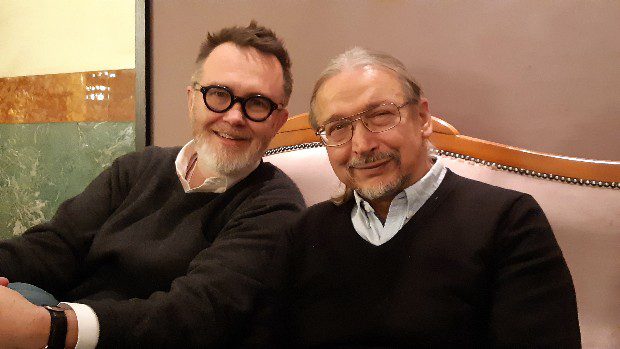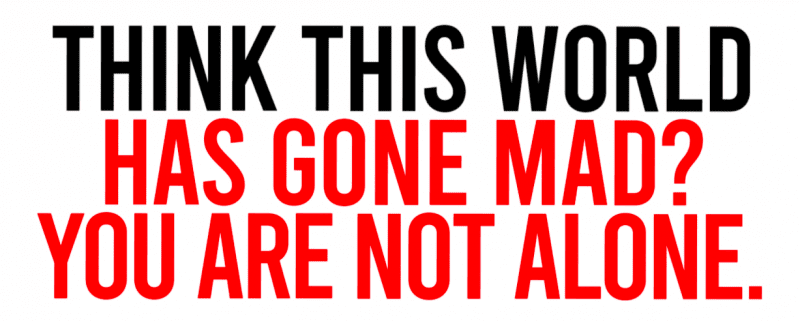You Aren’t Crazy — And You Aren’t Alone

I had breakfast this morning with some Christian friends — a married couple and their kids — traveling through from southern California. They reported to me that everybody they know in church circles is reading Live Not By Lies. That’s always gratifying to hear, but what intrigued me was what they said beyond that.
The mom said that she’s finding that her Christian mom friends are devouring the book. She said that they have all come through reading Jen Hatmaker, Glennon Doyle, and those other therapeutic Christian-ish women writers, and have all been left feeling empty and lost. What’s getting to them all right now is their fears for their young children coming at them from this culture (especially in California). “The mama bear instinct is kicking in,” she said, “and we are now looking for something solid and true that can help us get through what’s coming.”
She said several times: “Being neutral is not enough.” What she meant is that it has finally begun to dawn on Christians in her circle that you cannot stay out of the fray, that you are going to have to take a stand. If you are not consciously and tenaciously a dissenter from pop culture, then you will be assimilated.
The husband talked about how a number of their Christian friends have become totally woke over this past year. The year 2020 was a time of separation. He said that it is now clear to his Christian circles that the people you go to church with aren’t necessarily the people who you want to be standing with when the bad stuff starts. He explained that a lot of church folks he knows are finding each other in small groups, even though they go to different churches. Some of them report that their churches may not be fully woke, but the churches are so desperate to avoid taking a hard stand on anything that might get them accused of bigotry that they are trying to avoid trouble.
These churches are not going to make it through what’s coming. And they are not going to prepare their people for it either. My friend said yes, this reality is sinking in with some of the Christians he knows, and they’re starting to act on it.
It really is a Kolakovic moment for America — a time to prepare, build networks, and dig in, before it all comes down.
I published a piece in the Deseret News today about how and why we US Christians need to prepare ourselves for what’s coming. I love telling the story of Alexander Ogorodnikov. Here’s how the piece starts:
I’m in Moscow, a stone’s throw from Red Square.
I’ve chosen this hotel, the Metropol, after reading Amor Towles’ 2016 bestseller “A Gentleman in Moscow,”where the novel is set. The Metropol, radiating old-world charm, does not disappoint.
But the old man mounting the stairs at the hotel’s entrance, coming to meet me, does not share my daydream affection for the place. The warmth and luxury into which Alexander Ogorodnikov, 70, has stepped from the cold does not melt his icy scowl. We shake hands, and take our seats on a nearby sofa. He mutters something in Russian to my interpreter, who turns to me and says, “Alexander is afraid when he comes into this hotel. In communist times, it was known as a center for the KGB.”
His fear is understandable. Born in the final years of Stalinist rule into a prominent Bolshevik family, he became a leader in the Soviet Union’s Komsomol pro-Lenin youth movement. But in 1973, he scandalized his parents and the Communist Party by converting to Christianity. He organized a small fellowship of fellow Orthodox Christians and began campaigning for religious liberty, for which the Soviets sent him to prison in 1978.
Ogorodnikov wasn’t sentenced to death, but the Soviet authorities nevertheless decided to make an example of the young man who had renounced communist privilege for Christ. They placed him on death row in one of the USSR’s hardest prisons — a facility where, according to one of Ogorodnikov’s captors, the state sent people to be broken, “to bleed you out, drop by drop.”
Recalling the experience to me, Ogorodnikov is pensive and reverential. “When I went into the cell and looked at the others who were there, I told them, ‘Listen brothers, I was sent here to help you meet death, not as criminals but as men with souls that are going to meet their makers, to go meet God the Father,’” he says.
Not yet 30 at the time, Ogorodnikov told these hardened criminals that though he was not a priest, he would still be willing to hear their confessions. “I told them I couldn’t absolve them, but when I die and go before the Lord, I will be a witness to their repentance,” he recounts. “If I wanted to describe for you their confessions, I would need to be Dostoevsky. I don’t have the words myself.”
When the prison authorities realized that confinement in a cell with the worst of the worst was not leading Ogorodnikov to repent of his supposed sins against the Soviet state, they put him in solitary confinement. He was eventually moved to another prison entirely, and it was there where Ogorodnikov says he heard the most haunting confessional. This time, it didn’t come from a prisoner, but from a prison guard.
One night, the single guard on duty entered Ogorodnikov’s cell with a wild look on his face. “They come at night,” the old guard said to Ogorodnikov. He then told Ogorodnikov who exactly was coming at night from the prison guard’s past and haunting him:
“When I was a young guard in a different prison, they would gather 20 or 30 priests who had been behind bars, and take them outside. They rigged them up to a sled, so that they were pulling the sled. They had them pull the sled out into the forest. They made them run all day, until they brought them to a swamp. And then they put them into two rows, one behind the other. I was one of the guards who stood in the perimeter around the prisoners.
“One of the KGB guys walked up to the first priest. He asked him very calmly and quietly, ’Is there a God?’ The priest said yes. They shot him.
“Then, he continued, they went to the next priest, and asked, ‘Does God exist?’
“‘Yes, he exists.’
“The KGB man shot this priest in the same way. We didn’t blindfold them. They saw everything that was about to happen to them.”
Ogorodnikov, whose face remains partially paralyzed from his prison beatings, fights back tears as he comes to the end of telling me this story. In a voice cracking with emotion, the former political prisoner says, “Not one of those priests denied Christ.”
We are not the Soviet Union here, and are probably not going to be. But if the extremes of “hard totalitarianism” in the USSR causes us to ignore the emerging soft totalitarianism here, we are going to be caught off guard, and be vulnerable. That’s what my book is about.
So many Christian churches are so desperate to be thought of as nice that they are opening themselves up to anti-Christian ideology. For example, if your church is promoting Ibram X. Kendi and his thought, leave. It is radically anti-Christian. Here is Kendi himself, speaking about it in a woke church in Manhattan:
Ibram Kendi, speaking in a Manhattan church, says “antiracists” fundamentally reject “savior theology” (“the Christian is to go out and save these individuals who are behaviorally deficient”) and embrace liberation theology (“the Christian is to revolutionize society”). pic.twitter.com/sMsKaWAjRe
— Woke Preacher Clips (@WokePreacherTV) March 23, 2021
Andrew Beckwith, a brave Christian who leads the Massachusetts Family Institute, writes this morning:
The first week of the Live Not By Lies book club went really well. We had 150 people zooming in. You can see it here on youtube: https://www.mafamily.org/icymi-mfi-book-club-session-1/
The level of excitement about your book surprises even me, and I’m a huge fan. People keep reaching out to me and telling me how much they love the book and how glad they are that MFI is doing this. You’ve really struck a chord with LNBL.
Tonight’s session, I will have about half a dozen college-age students on to talk about what their families did to help keep them in the faith and navigate the pressures of LGBTQ, liquid modernity, etc. I intentionally picked younger adults, because they lived their formative years during the madness of the last two decades, basically since I went to law school. I’m asking them to look at the practices of the Benda family and compare their own experiences. Interestingly, so far, the most consistent theme they share with the Bendas is “do not be afraid to be weird in society’s eyes.”
You want to join tonight’s book club session, which kicks off at 7pm Eastern time? Click here to register.
I love the way the MFI is presenting Live Not By Lies:

This is what I heard from my California friends this morning, and what I’ve heard on recent travels to Birmingham and to northern Virginia: that people who thought they were alone in thinking that this world is going crazy are discovering that no, there are others of us, and there are those among us who have lived through this sort of thing before. We have to awaken ourselves to the radical nature of what’s going on, lay aside our fear of being seen as weird or mean in society’s eyes, and prepare ourselves, our families, and our churches for the hard struggle ahead.
We cannot wish it away. It’s here, and more is coming. Now is the time of testing what we’re made of. Are were mere admirers of Christ, or are we disciples? Here is a scene from Terrence Malick’s A Hidden Life that speaks directly into our crisis. The church painter is working just before the Nazis take over:
The painter says — speaking of the Nazi period — that a time is coming when people will not even fight the truth — they’ll just ignore it.
For us, that time is now. What are you going to do about it?
Late last week this appeared on the Theoria channel. Watch it and share it, please:
Subscribe for as little as $5/mo to start commenting on Rod’s blog.